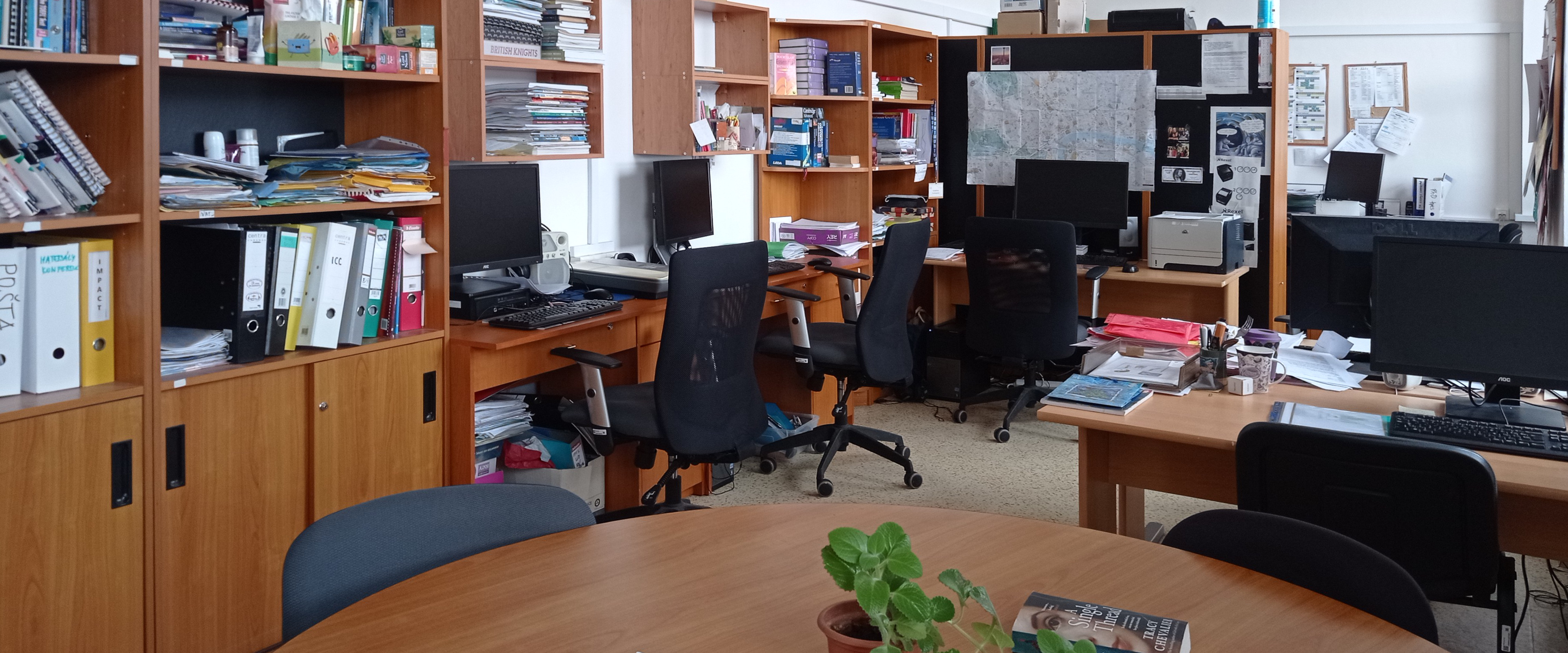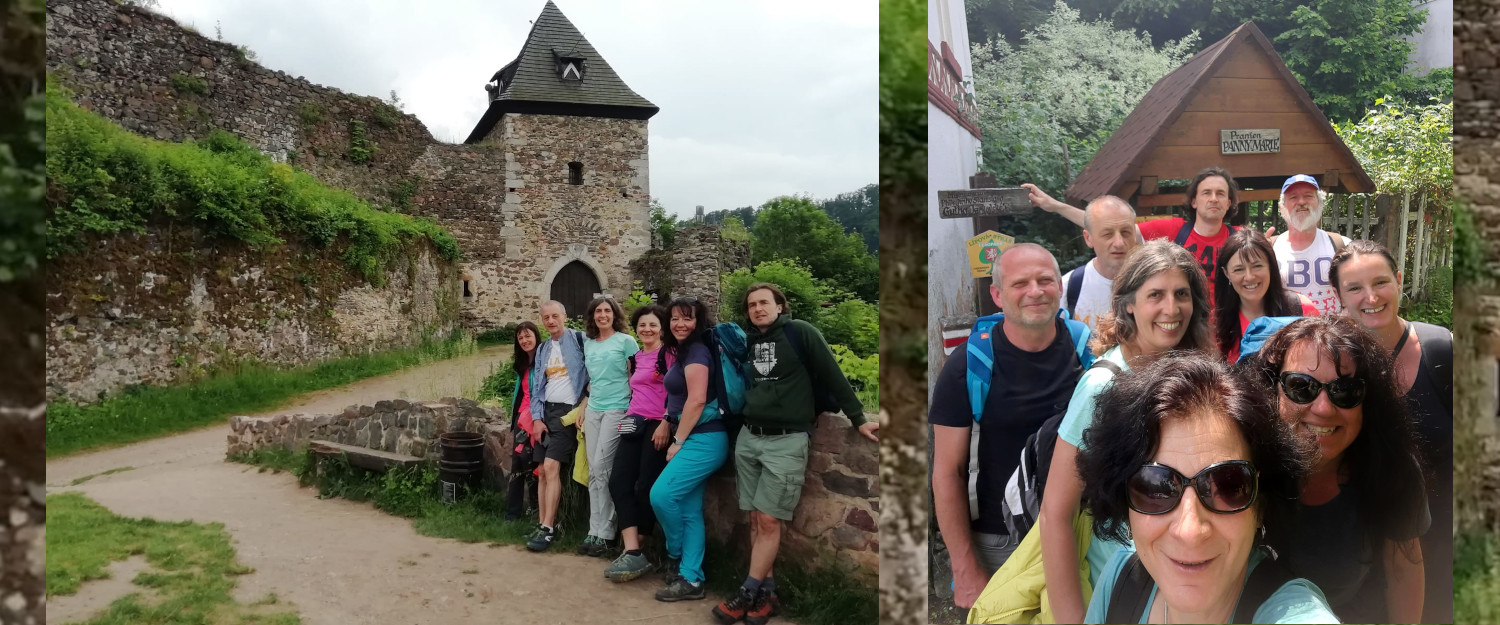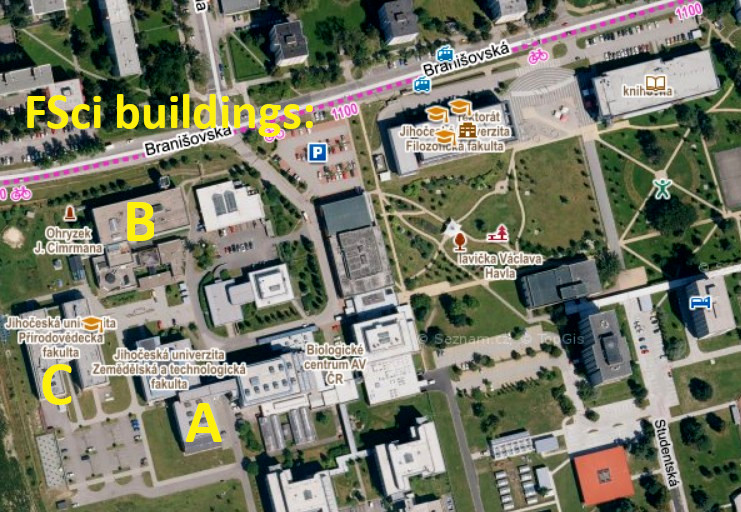Popis jazykových kurzů
V popisech kurzů používané zkratky SERR/CEFR označují Společný evropský referenční rámec (anglicky CEFR = Common European Framework of Reference for Languages), jenž popisuje jazykové úrovně A1–C2. Co by měl na každé z nich student zvládat, lze zjistit v tabulkách k SERR/CEFR na stránce Pro studenty.
Svou úroveň můžete také zjistit pomocí rozřazovacích testů, z nichž některé uvádíme tamtéž.
-
Sylabus kurzů bakalářské angličtiny
Kurz Vstupní úroveň Výstupní úroveň BA1 úplní začát. ZS/LS A0 A2 BA1 ZS/LS A1 A2 BA2 ZS/LS A2 B1 BA3 ZS/LS B1 B2 Náplň kurzů
Hlavní: Functions, Grammar/structures, Vocabulary, pronunciation
Vedlejší: Reading skills, listening skills, speaking skills, writing skills
- General International English
- Communicative approach
Materiály
- New Headway Elementary, Pre-intermediate, Intermediate
- New English File Elementary, Pre Intermediate, Intermediate
- Murphy, R. Essential Grammar in Use
- Murphy, R. English Grammar in Use
- English Vocabulary in Use Elementary, Pre-Intermediate and Intermediate, Upper-Intermediate
- Azar, Betty Schrampfer: Fundamentals of English Grammar
- Azar, Betty Schrampfer: Understanding and Using English Grammar
- Vince, Michael: Elementary Language Practice
- Vince Michael: Intermediate Language Practice
- Vince, Michael: First certificate Language Practice
- ...a další dle uvážení lektora
Podrobný sylabus pro kurzy s českým učitelem
Course Semester Functions/discourse markers Grammar/structures Topics/Vocabulary BA1
A1-A2ZS
Describing habits and routines
Describing places
Describing things
Describing past experiences
Linkers sequential – past timeQuestions, question words
Present Simple
Adverbial phrases of time/place and frequency including word order
Imperatives
Present Continuous
'Have/have got
Possessive ‘s, s’'
Possessive pronouns
Past Simple
Used to
“Wh” questions in the past
Past Continuous
Countable and uncountable nouns
Determiners Much/many/some/any/all/no/none
something/somebody/anything/anybody/everything/everybody/everywhere/somewhere/anywhere
A few/ a little/a lot of
Articles with countable and uncountable nouns
Demonstrative this/that/these/thosePhrasal verbs (common)
Adverbs of frequency
Simple adverbs of place/manner/time
Prepositions of time on/in/at
Prepositions of place
Personal details
Family
Numbers, time
Food and drink
Things in the town, shops, shopping
Hobbies and pastimes
Holidays
Inside the house
Objects and rooms
In the classroomLS
Describing people
Obligation and necessity
Requests
Suggestions
Advice
Invitations
Offers
Possibility
Arrangements/-ing to meet peopleVerb + gerunds/infinitives,
To infinitive to express purpose
Like/would like/what’s…like
Going to
Will
Present continuous the for future
Future time (will x going to)
Comparative and superlative forms of adjectives,
Use of than, (not)as…as
Present Perfect Simple
For/Since
Modal verbs – can/could/must/have to/ should/may/might
Zero and First Conditional, Time clauses
-ed/-ing adjectivesPrepositional phrases (place/time/movement)
Phrasal verbs (common)
Adjectives personality, description, feelings
Basic intensifiers (very/really/quite/so/a bit)
Work and jobs
Education
Leisure activities
Animals
Clothes
Weather
Going out
Other countries
Travel and services
TransportCourse
Semester
Functions/discourse markers
Grammar/structures
Topics/Vocabulary
BA1
úplní začátečníci
A0-A2
Jako BA1 a k tomu
Directions
Describing habits and routines
Giving personal information
Greetings
Telling the time
Directions
Understanding and using numbers
Understanding and using prices
Connecting words (and, but, because)Adjectives common and demonstrative
Adverbs of frequency
Articles a/an/the
Comparatives and superlatives
Determiners basic
Going to
How much/how many
Have/have got
Very common uncountable nouns
I’d like
Imperatives
Intensifiers very basic
Modals can/can’t, could/couldn’t
Past Simple of TO BE
Past Simple
Possessive adjectives
Possessive ‘s
Prepositions common
Prepositions of place
Prepositions of time including in/on/at
Present Continuous
Present Simple
Pronouns simple, personal
Questions
There is/there are
To be, incl questions, negatives
Verb +ing, like/hate/loveFood and drink
Nationalities and countries
Personal information
Things in the town, shops, shopping
Verbs – basic
Family life
Hobbies and pastimes
Holidays
Leisure activities
Shopping
Work and jobs
Clothes
Colours
Dimensions
Ways of travellingCourse
Semester
Functions/discourse markers
Grammar/structures
Topics/Vocabulary
BA2
A2-B1
ZS
Describing feelings and emotions, attitudes
Describing places
Giving advice
Expressing opinions
Agreeing and disagreeing
Initiating and closing conversation
Describing peopleSimple passives
Second conditional (revision of first conditional)
Present Perfect continuous
Present Perfect simple x continuous
Present Perfect x Past Simple
Past Perfect
Reported statements
-ed/-ing adjectives
Future (will/going to / present simple, continuous,/may/might/future in time clauses)
Adjectives - collocation of adjective
Articles with countable and uncountable nouns
Determiners – broad range (e.g. all the, most, both)Phrasal verbs extended
Collocations (tell a story, keep a promise..)
Broader range of intensifiers such as too, enough
Things in the town, shops and shopping
Travel and holidays
Vehicles and transport
Hotels and restaurants
Sport and leisure activities
Numbers, size, dimension, shapes, patterns
Health and the body
Feelings, features of character
Adjectives to describe peopleLS
Describing past experiences and events, storytelling
Requests and offers
Checking understanding
Managing interaction (interrupting, changing the topic, resuming or continuing)
Talking about films and books
Markers to structure informal spoken discourse
Linkers – sequential past timeQuestions, subject/object questions
Question tags, short answers
Past time (Past Simple x Past Continuous, Past Perfect), Active/Passive
Used to
Would to express habit in the past
Modal verbs must/can’t deduction in present
Modal verbs may/might/can/could/have to/ allowed to/must/mustn’t should/ought to/need to
Comparatives and superlatives
Adverbs x adjectives
Adverbial phrases of degree/extent/ probability
Adverbial phrases of time/place frequency incl. word order
Comparative and superlative form of adverbs
Connecting words expressing cause and effect, contrast etc.Phrasal verbs extended
Collocations
Colloquial language
Art, music and literature
Sport and leisure
Clothes and appearance
Food, restaurants and cooking
Education
Media - TV and Internet
Technology – mobiles and computers
News, lifestyles and current affairsCourse
Semester
Functions/discourse markers
Grammar/structures
Topics/Vocabulary
BA3
B1-B2ZS
Describing hopes and plans
Critiquing and reviewing
Developing an argument
Encouraging and inviting another speaker to continue, come in
Managing interaction
Taking initiative in interaction
Expressing opinion, justification
Agreeing and disagreeing
Expressing reaction, indifference
Checking understanding
Linkers although, in spite of, despite
Connecting words expressing cause and effect, contrast etc.Future forms (will/going to / present simple, continuous,/may/might/future in time clauses)
Future continuous
Future perfect introduction
Gerunds and infinitives extended
Conditionals First, Second, Third, Mixed
Wish
Relative clauses
ArticlesPhrasal verbs extended
Collocations
Colloquial language
Contrasting opinions
The weather
Books and literature
Arts
Film
Science and Technology
Entertainment and the arts
Health and the body
The natural worldLS
Speculating
Describing experiences
Describing feelings and emotions
Interacting informally, reacting, expressing interest, sympathy, surprise etc
Expressing abstract ideas
Synthesizing, evaluating, glossing info
Giving precise information
Expressing certainty, probability, doubt
Generalising and qualifying
Linkers sequential – past time -subsequently
Discourse markers to structure formal speechModal verbs of deduction and speculation present/past
Can’t have/ needn’t have
Revision of all tenses active/passive
Narrative tenses
Would to express habits in the past
Passives – all passive forms
Reported speech
Adjectives and adverbs
Attitudinal adverbs
Collocation of intensifiersPhrasal verbs extended
Collocations
Colloquial language
Summarising exponents
Crime and the law
Money
Media
People and behavior
Feelings and opinions
Education and learning
News, lifestyles and current affairs
Word formation -
Sylabus kurzů bakalářské angličtiny NS
Kurzy NS na úrovni BA1 nemusí být vyučovány rodilým mluvčím.Náplň kurzů
Dovednosti čtení, poslech, mluvení, psaní, slovní záspba, výslovnost (Reading skills, listening skills, speaking skills, writing skills, vocabulary, pronunciation)
- Všeobecná mezinárodní angličtina, angličtina pro akademické účely (General International English, EAP)
- Komunikaticní přístup / Communicative approach
Kurz Vstupní úroveň Cílová úroveň BA1 NS úplní začát. ZS/LS A0 A2 BA1 NS ZS/LS A1 A2 BA2 NS ZS/LS A2 B1 BA3 NS ZS/LS B1 B2 Skills
READING:
articles, 8 articles per semesterWRITING:
3 pieces of writing per semesterBA1 NS WS
- Fill in a form
- An informal letter/email
- A story behind a photo
- A postcard
- A description (person/place)
- Writing instructions
- A holiday report
BA1 NS SS
- The above and/or
- A simple formal email
- Describing a building
- Giving opinion
- A story – describing an experience/impression
- A simple magazine article
BA2 NS WS (250 words)
- informal letter
- formal letter
- descriptions, autobiography
BA2 NS SS (250 words)
- composition (pros & cons)
- story, narrating an event
- review, report
BA3 NS WS
- paraphrasing/summarizing a written text 150-200 words
- letters (formal & informal)
- composition (pros & cons) 500 words
BA3 NS SS
- paraphrasing/summarizing oral text 150-200 words
- paraphrasing/summarizing written text 150-200 words
- composition (pros & cons) 500 words
SPEAKING:
BA1 NS WS
- Dialogues/interviews in pairs/groups on personal topics
BA1 NS SS
- Dialogues/interviews in pairs/groups on personal topics
BA2 NS WS
- dialogues/interviews in pairs on personal topics
- mini-presentations
BA2 NS SS
- dialogues/interviews in pairs on general topics
- mini-presentations
BA3 NS WS
- presentations
BA3 NS SS
- role-plays, negotiations, problem-solving, simulations
LISTENING:
All courses and semesters:
- gist
- purpose
- specific information
- multiple choice
- dialogues
- lectures
- note-taking
Výběr možných témat
BA1 NS WS
- Personal details
- Clothes
- Numbers, time
- Food and drink
- Shops, shopping
- Hobbies and pastimes
- Holidays
- Weather
- Travel and services, Transport
BA1 NS SS
- Work and jobs
- Education, In the classroom
- Leisure activities
- Animals
- Going out
- Other countries
- Things in the town
- Inside the house
- Objects and rooms
BA2 NS WS
- Things in the town, shops and shopping
- Travel and holidays
- Vehicles and transport
- Hotels and restaurants
- Sport and leisure activities
- Numbers, size, dimension, shapes, patterns
- Health and the body
- Feelings, features of character
- Adjectives to describe people
BA2 NS SS
- Art, music and literature
- Sport and leisure
- Clothes and appearance
- Food, restaurants and cooking
- Education
- Media - TV and Internet
- Technology – mobiles and computers
- News, lifestyles and current affairs
BA3 NS WS
- The weather
- Books and literature
- Arts
- Film
- Science and Technology
- Entertainment and the arts
- Health and the body
- The natural world
BA3 NS SS
- Crime and the law
- Money
- Media
- People and behavior
- Feelings and opinions
- Education and learning
- News, lifestyles and current affairs
- Word formation
Výběr možných Functions / discourse markers
BA1 NS WS
- Describing habits and routines
- Describing places
- Describing things
- Describing past experiences
- Linkers sequential – past time
BA1 NS SS
- Describing people
- Obligation and necessity
- Requests
- Suggestions
- Advice
- Invitations
- Offers
- Possibility
- Arrangements/-ing to meet people
BA2 NS WS
- Describing feelings and emotions, attitudes
- Describing places
- Giving advice
- Expressing opinions
- Agreeing and disagreeing
- Initiating and closing conversation
- Describing people
BA2 NS SS - Describing past experiences and events, storytelling
- Requests and offers
- Checking understanding
- Managing interaction (interrupting, changing the topic, resuming or continuing)
- Talking about films and books
- Markers to structure informal spoken discourse
- Linkers – sequential past time
BA3 NS WS - Describing hopes and plans
- Critiquing and reviewing
- Developing an argument
- Encouraging and inviting another speaker to continue, come in
- Managing interaction
- Taking initiative in interaction
- Expressing opinion, justification
- Agreeing and disagreeing
- Expressing reaction, indifference
- Checking understanding
- Linkers although, in spite of, despite
- Connecting words expressing cause and effect, contrast etc
BA3 NS SS - Speculating
- Describing experiences
- Describing feelings and emotions
- Interacting informally, reacting, expressing interest, sympathy, surprise etc
- Expressing abstract ideas
- Synthetizing, evaluating, glossing info
- Giving precise information
- Expressing certainty, probability, doubt
- Generalising and qualifying
- Linkers sequential – past time -subsequently
- Discourse markers to structure formal speech
Angličtina – zimní semestr
-
OJZ 100 – Bakalářská angličtina 1 pro úplné začátečníky
-
OJZ 110 – Bakalářská angličtina 1
-
OJZ 120 – Bakalářská angličtina 2
-
OJZ 130 – Bakalářská angličtina 3
-
OJZ 210 – Bakalářská angličtina 1 NS
-
OJZ 220 – Bakalářská angličtina 2 NS
-
OJZ 230 – Bakalářská angličtina 3 NS
-
OJZ 310 – English for Academic Purposes 1
-
OJZ 320 – English for Academic Purposes 2
-
OJZ 330 - TOEFL ITP Preparation. Grammar and Vocabulary
-
OJZ 410 – Presentation Skills in English
-
OJZ 420 – Academic Writing
-
OJZ 430 - TOEFL ITP Preparation. Listening and Reading
-
OJZ 440 – Debate and Discussion in English
-
OJZ 450 – Scientific Writing
-
OJZ 500 – Doktorandská angličtina
-
OJZ 510 – Kurz angličtiny pro BCH a BI
-
OJZ 520 – English for IT 1
-
OJZ 525 – English for Science 1
-
OJZ 530 - English for the Workplace 1
-
OJZ 531 - English for the Workplace 2 (od ZS ak. r. 2021–22)
-
OJZ 532 - English for Meetings and Social Skills
-
OJZ 540 - English for Autonomous Learning
-
OJZ 545 - English for TOEIC B2
-
OJZ 546 - English for TOEIC C1
-
OJZ 555 - English for Intercultural Communication
-
OJZ 560 – English through Sustainability
-
OJZ 600 – Bakalářská angličtina 4 - idiomatický jazyk
-
OJZ 610 – Bakalářská angličtina 4 - praktický jazyk
-
OJZ 670 – Anglická konverzace, CEFR: B1-B2
-
OJZ 680 - Blokový přípravný kurz na zkoušku TOEIC Listening and Reading pro studenty
-
OJZ 682 - Blokový přípravný kurz na zkoušku TOEFL ITP pro studenty
Angličtina – letní semestr
-
OJZ 101 – Bakalářská angličtina 1 pro úplné začátečníky
- OJZ 111 – Bakalářská angličtina 1
- OJZ 121 – Bakalářská angličtina 2
- OJZ 131 – Bakalářská angličtina 3
- OJZ 211 – Bakalářská angličtina 1 NS
- OJZ 221 – Bakalářská angličtina 2 NS
- OJZ 231 – Bakalářská angličtina 3 NS
- OJZ 310 – English for Academic Purposes 1
- OJZ 320 – English for Academic Purposes 2
- OJZ 330 - TOEFL ITP Preparation. Grammar and Vocabulary
- OJZ 410 – Presentation Skills in English
- OJZ 420 – Academic Writing
- OJZ 430 - TOEFL ITP Preparation. Listening and Reading
- OJZ 440 – Debate and Discussion in English
- OJZ 450 – Scientific Writing
- OJZ 500 – Doktorandská angličtina
- OJZ 521 – English for IT 2
- OJZ 526 – English for Science 2
- OJZ 530 - English for the Workplace 1
- OJZ 531 - English for the Workplace 2
- OJZ 532 - English for Meetings and Social Skills
- OJZ 540 - English for Autonomous Learning
- OJZ 545 - English for TOEIC B2
- OJZ 546 - English for TOEIC C1
- OJZ 555 - English for Intercultural Communication
-
OJZ 560 – English through Sustainability
- OJZ 600 – Bakalářská angličtina 4 - idiomatický jazyk
- OJZ 610 – Bakalářská angličtina 4 - praktický jazyk
- OJZ 630 – Academic Writing for Crossborder Studies
- OJZ 670 – Anglická konverzace, CEFR: B1-B2
- OJZ 680 - Blokový přípravný kurz na zkoušku TOEIC Listening and Reading pro studenty
- OJZ 682 - Blokový přípravný kurz na zkoušku TOEFL ITP pro studenty
Další jazyky
Kurzy OJZ 550 – Čeština pro cizince a OJZ 727 – Německá konverzace
nabízíme v obou semestrech
ŠJ, FJ, NJ a RJ:
ZS – lichá čísla
LS – sudá čísla
-
OJZ 550 – Čeština pro cizince
- OJZ 701 – Španělština 1
- OJZ 702 – Španělština 2
- OJZ 703 – Španělština 3
- OJZ 704 – Španělština 4
- OJZ 705 – Španělština 5
- OJZ 706 – Španělština 6
- OJZ 711 – Francouzština 1
- OJZ 712 – Francouzština 2
- OJZ 713 – Francouzština 3
- OJZ 714 – Francouzština 4
- OJZ 715 – Francouzština 5
- OJZ 716 – Francouzština 6
- OJZ 721 – Němčina 1
- OJZ 722 – Němčina 2
- OJZ 723 – Němčina 3
- OJZ 724 – Němčina 4
- OJZ 725 – Němčina 5
- OJZ 726 – Němčina 6
- OJZ 727 - Německá konverzace
- OJZ 731 – Ruština 1
- OJZ 732 – Ruština 2
- OJZ 733 – Ruština 3
- OJZ 734 – Ruština 4
Číst dál …Popis jazykových kurzů
- Přečteno: 4228


 Standardně probíbají v kanceláři OJZ (budova A, 3. patro).
Standardně probíbají v kanceláři OJZ (budova A, 3. patro).